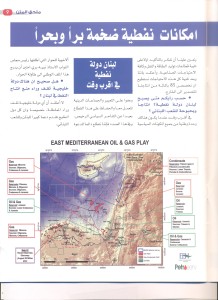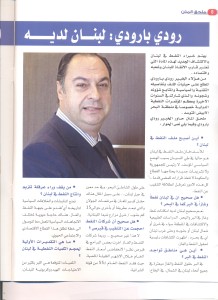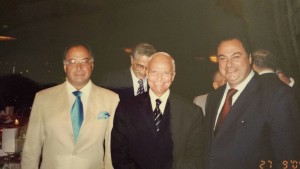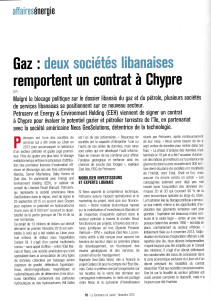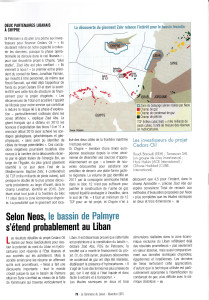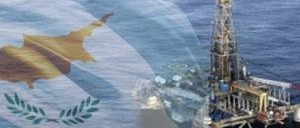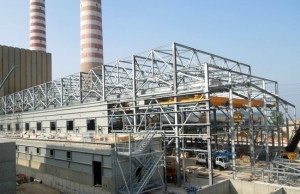هل يلتئم مجلس الوزراء بحكم “الضرورة” لإقرار مراسيم النفط؟ هيئة إدارة البترول تتحرّك في اتجاه المعنيين محذرة من الخطر الإسرائيلي بارودي: للحدّ من هدر الوقت في هذا القطاع الاقتصادي المهم والحساس

تتسارع التطورات على الساحة النفطية الدولية، ولا سيما من الجهة الإسرائيلية حيث العمل على استكمال الإستكشاف والتنقيب عن الذهب الأسود والغاز وصولاً إلى الإنفتاح على الأسواق التسويقية في أوروبا وغيرها، في حين ينأى لبنان عن الإفادة من ثروته النفطية ويكتفي بالتقاط أنفاسه خوفاً من تعديات إسرائيلية محتملة على حدوده النفطية.
واستغربت مصادر متابعة عدم تحريك الدولة ساكناً اتجاه هذا الملف، فيما أن ما كشفته “داتا المسح الجوي للبرّ اللبناني” حول توفر مخزون بترولي في مناطق محددة في البرّ يشكل نتائج أولية مشجعة، وأن هذه الخلاصات نتيجة المسح الجيولوجي الجيوفيزيائي الجوي لمنطقة لا تتجاوز مساحتها 6000 كلم 2، 4000 منها في الشمال و 2000 منها تمثل الساحل اللبناني.
ولفتت إلى أن التركيبة الجيولوجية لهذه المنطقة تمتد باتجاه البقاع الاوسط وتعطي مؤشرات ايجابية عن احتمال وجود نفط في هذه المنطقة أو غاز أو كلاهما.
في غضون ذلك، تسارع هيئة إدارة قطاع النفط في لبنان، الخطى سعياً لتحقيق “الضرورة”، إلى حث المسؤولين المعنيين على أهمية إقرار مرسومي النفط المتعلقين بعقد تقاسم الأرباح مع الشركات وبتحديد البلوكات البحرية، والقانون الخاص بالضريبة على الأنشطة النفطية.
وعمدت الهيئة في هذا السياق، إلى رفع تقرير منذ أسبوعين، إلى كل من وزير الطاقة والمياه أرتور نظريان، تنذر فيه من الخطر الإسرائيلي الداهم على الحدود حيث يتم تطوير حقول نفطية ومنها حقل “كاريش” القريب من الحدود البحرية اللبنانية.
وأرسل الوزير نظريان بدوره نسخة من التقرير إلى كل من رئيس مجلس النواب نبيه بري ورئيس الحكومة تمام سلام ووزير الخارجية جبران باسيل، بهدف استنفار القوى واتخاذ القرار السياسي القاضي بتحديد موعد جلسة قريبة لمجلس الوزراء لإقرار مرسومي النفط لاستكمال دورة التراخيص الأولى.
بارودي: القطاع فرصة للمصالحة
الخبير النفطي رودي بارودي شدد رداً على سؤال لـ‘”الشرق”، على “أهمية دعوة الرئيس بري إلى إقرار مراسيم إدارة البترول من داخل مجلس الوزراء، من أجل الحدّ من هدر الوقت في هذا القطاع الاقتصادي المهم والحساس بالنسة إلى لبنان، في حين تحاول دول المنطقة والشركات العالمية الإفادة من العامل الزمني من خلال تعزيز التعاون وتكثيف الإستكشافات. من هنا، ضرورة إدراج هذا الموضوع على طاولة الحوار والسعي إلى إقرار ما يلزم من مراسيم وقوانين، لبنان في أمسّ الحاجة إليها”.
وليس بعيداً، أكد “ضرورة الإنتهاء من وضع اللمسات الأخيرة على نموذج اتفاق Unitization للغاز بين لبنان وقبرص، الأمر الذي يؤدي الى تحديد شروط الإحتياطي المشترك عائدات/تسييل المحتملة بين البلدين، لكون قبرص تشكّل مركزاً مهماً من الـ” ENERGY HUB ” في شرق البحر الأبيض المتوسط نظراً إلى موقعها الجغرافي، إضافة إلى كونها عضواً في الإتحاد الأوروبي”.
وإذ لفت إلى أن “هذا القطاع الاقتصادي يجب أن يكون فرصة للمصالحة بين جميع اللبنانيين، بغية التوافق في ما بينهم لما فيه مصلحة أكيدة وكبيرة للشعب اللبناني بكل فئاته”، قال بارودي: المرحلة الراهنة مناسبة جداً لمتابعة الأعمال التحضيرية في ظل بلوغ سعر برميل “برنت” 47 دولاراً، للتمكن من استغلال الودائع المرتقبة للبنان، إذ أن أي اكتشافات ستساعد حتماً في النمو الاقتصادي ومحاربة الفقر.
نص التقرير
وهنا نص التقرير الذي رفعته هيئة إدارة قطاع النفط إلى الوزير نظريان الذي بدوره أرسل نسختين منه إلى بري وسلام وباسيل:
– أولاً: سبق لهيئة إدارة قطاع البترول أن أعدت سابقاً تقريراً تقنياً لمعالي وزير الطاقة والمياه بتاريخ 16/7/2013 حول المكامن الجنوبية اللبنانية والخطر الإسرائيلي على الموارد البترولية اللبنانية جنوب المنطقة الاقتصادية الخالصة اللبنانية وبالتحديد على الحدود البحرية مع فلسطين المحتلة.
وتضمّن التقرير يومها شرحاً تفصيلياً للاعتداءات التي تقوم بها إسرائيل على الحدود البحرية مع فلسطين المحتلة ولا سيما عند نقطة تبعد نحو 9 كلم عن الحدود اللبنانية الفلسطينية في المياه البحرية، وما يُسمى من قبل العدو الإسرائيلي بحقل غاز «كاريش»، لجهة إمكانية شفط الموارد البترولية اللبنانية.
– ثانياً: يهم هيئة إدارة قطاع البترول وبعد المعلومات الجديدة التي استقصتها الهيئة حول قيام العدو الإسرائيلي بالانتقال إلى مرحلة تطوير حقول مكتشفة من قبله في مياه فلسطين المحتلة على مقربة من الحدود البحرية اللبنانية، أن تضع هذه المعلومات بين أيديكم.
– ثالثاً: ورد في صحيفة Jerusalem Post بتاريخ 29/10/2015 أن الوزير الإسرائيلي (للبنى التحتية الوطنية الطاقة والموارد المائية) يوفال ستينيتز قد التقى المدير التنفيذي لشركة ENI الإيطالية دسكيلازي بهدف تعزيز التعاون بين الشركة وإسرائيل ومصر وقبرص، حول المسائل المتعلقة بالغاز وبحماية أمن الطاقة في إسرائيل وأوروبا.
ومن أبرز ما تم تداوله في هذا الاجتماع هو الاقتراح الذي تقدم به ستينيتز لدسكيلازي حول قيام شركة ENI بالاستثمار في حقلي “كاريش” (1Tcf) و”تانين” ( 1.2Tcf ) حيث من المحتمل أن تتجاوز هذه الحقول حدود المياه البحرية الإسرائيلية لتصل إلى المنطقة الاقتصادية الخالصة اللبنانية، وفق ما جاء في الصحيفة.
وصرّح دسكيلازي للصحيفة أن «مشاركة موارد الطاقة المستقبلية وكذلك الصادرات والبنى التحتية للنقل بين إسرائيل، قبرص ومصر ستُساهم في تشكيل محور إقليمي للغاز لدعم أمن الطاقة الأوروبي». كما أضاف أن شركات النفط العالمية لا تزال مهتمة بالتنقيب في المياه البحرية الإسرائيلية (فلسطين المحتلة) مشدداً على أن “كل من يريد أن يكون جزءاً من التعاون الإقليمي، عليه أن يكون مرتبطاً بطريقة أو بأخرى بإسرائيل”.
وتابعت الصحيفة أنه بعد استقالة وزير الاقتصاد الإسرائيلي أرييل درعي أصبحت صلاحيات وزارة الاقتصاد التي من صلاحياتها إدارة ملف النفط في إسرائيل في يد رئيس وزراء العدو، وهو ينوي تطبيق المادة 52 من القانون الإسرائيلي 1988 (قانون مكافحة الإحتكار) التي ستسمح له بالتهرّب من اعتراضات مفوض مكافحة الاحتكار في مسألة العلاقات الخارجية والأمن القومي وتمرير صفقة الغاز حول حقلي “كاريش” و”تانين”.
وفي ما يتعلق بخطة الغاز، أشار ستينيتز إلى أن دخول خطة الغاز حيّز التنفيذ سيؤدي إلى تطوير حقول ليفياتان، كاريش وتمار، وبعد الموافقة على خطة الغاز، ستتمكن كل من شركتي Delek Group وNoble Enerfy من البقاء في حقل ليفياتان على أن تقوم الشركتان ببيع أسهمهما في حقول كاريش وتانين خلال 4 أشهر من الإعلان الرسمي عن خطة الغاز.
إن المعلومات الواردة أعلاه تؤكد بشكل قاطع أن العدو الإسرائيلي سوف يقوم بتطوير حقلي “كاريش” و”تانين” وهذا ما دفع إلى التواصل مع العملاق الإيطالي ENI.
– رابعاً: المعلومات التقنية عن حقلي كاريش وتانين:
1- حقل غاز تانين (Tanin) في رقعة Alon A تم اكتشافه في شهر شباط من العام 2012 على عمق 5551م (عمق المياه 1555م)، تم تقدير المخزون الغازي في هذا الحقل بـ1,2 تريليون قدم مكعب من الغاز.
2- حقل غاز كاريش (Karish) الأقرب إلى الحدود اللبنانية في رقعةAlon C: تم اكتشافه في شهر أيار من العام 2013 على عمق 4800م (1740م عمق المياه) يُقدّر المخزون الغازي في هذا الحقل بـ1 تريليون قدم مكعب من الغاز.
– خامساً: في الخطر المحدق: يتمثل الخطر المحدق بالموارد البترولية اللبنانية الآن بأن العدو الإسرائيلي قد بدأ سعيه الحثيث لتطوير هذين الحقلين من خلال جذب شركات أجنبية إلى هذا المضمار.
ويبدو أنه بدأ بتحقيق نتائج ملموسة في هذا المجال بعد لقاء نتنياهو المدير التنفيذي للعملاق الإيطالي ENI وهي شركة قد تم تأهيلها وفق دورة التأهيل المسبق التي أجرتها هيئة إدارة قطاع البترول في الربع الأول من العام 2013 للعمل في البحر اللبناني وعرض حقلي “كاريش” و”تانين” عليها بغية تطويرهما بعد تنازل شركة Noble الأميركية عنهما.
يُعدّ هذا مؤشراً خطيراً لأن شركة ENI قد تكون صرفت النظر عن الاستثمار في لبنان نظراً إلى التأخير الحاصل في دورة التراخيص وتعمل على تجميع الاكتشافات الحاصلة في بحر فلسطين المحتلة وقبرص واكتشاف زهر/ المصري وربط الانتاج بالأسواق الإقليمية عبر خطوط الغاز الطبيعي والأسواق العالمية لا سيما الأوروبية منها عبر الغاز المسالLNG والذي تسعى شركة ENI من تحويل الغاز الإسرائيلي والقبرصي إلى معمل دمياط المصري لتسييله والذي تملك ENI حصّة فيه تبلغ 40% .
هذا التحالف الغازي يُشكل تحدياً وخطراً على لبنان للأسباب الآتية:
1- قرار البدء بتطوير حقل «كاريش» القريب من حدود لبنان مع احتمال عال بتداخل الموارد الغازية مع لبنان.
2- الانعطاف الاستراتيجي في توجه شركة ENI للاستثمار في لبنان بحيث تكون قد قررت عدم العمل في لبنان واختيار إسرائيل كشريك لها.
3- نسج تحالف مُصدّري الغاز في المتوسط مع إسرائيل الأمر الذي يُحاصر لبنان طاقوياً ويجبره في المستقبل على اعتماد حلول قد تكون مكلفة للتصدير أو القبول بالتطبيع مع العدو الإسرائيلي طاقوياً.
وكانت هيئة ادارة قطاع البترول قد رفعت في العام 2013 كتابا الى وزير الطاقة والمياه انذاك جبران باسيل حول «المكامن الجنوبية اللبنانية والخطر الاسرائيلي»، اوصت فيه بوجوب اتخاذ الخطوات «السريعة» الآتية:
المضي قدما في اقرار مرسومي تقسيم المياه البحرية اللبنانية على شكل رقع (بلوكات) ودفتر الشروط لدورة التراخيص الاولى ونموذج اتفاقية الاستكشاف والانتاج.
استكمال الخطوات التنفيذية لدورة التراخيص الاولى وصولا الى تلزيم البلوكات لبدء نشاطات الاستكشاف والانتاج في اسرع وقت ممكن، للحد من الخطر الاسرائيلي المتربص بالموارد البترولية اللبنانية في جنوب لبنان.
التقيّد بالإستحقاقات المحددة بموجب خطة العمل والموافق عليها من قبل مجلس الوزراء بالقرار 41 تاريخ 27/12/2013.
